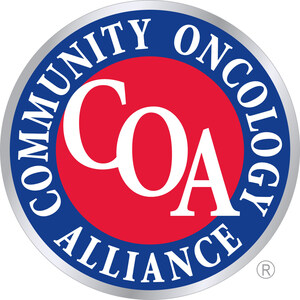Community Oncology Alliance Supports New Oncology Payment Reform Bill by Senators Cornyn and Carper
Legislation Based on the Oncology Medical Home Model Focuses on Quality, Efficient Cancer Care
WASHINGTON, July 15, 2016 /PRNewswire-USNewswire/ -- The Community Oncology Alliance (COA) commends Senators John Cornyn (R-TX) and Tom Carper (D-DE) for introducing the Cancer Care Payment Reform Act of 2016 (S. 3211) establishing a national Oncology Medical Home (OMH) demonstration project for payment reform under the Medicare program. The purpose of the bill is to change the way Medicare pays for cancer treatment in order to provide well-coordinated, high quality care that results in lower overall costs to cancer patients and the health care system. COA will be asking community oncology practices to actively enlist the support of their Senators to build upon the bipartisan co-sponsorship of this legislation.
"The Oncology Medical Home (OMH) is a proven model for driving high quality and efficiency in cancer care. This bill is the kind of thoughtful, bipartisan public policy that we need more of in cancer care. It will finally allow Medicare to see what private payers have known for years, which is that the OMH works," said Bruce Gould, MD, president of COA and medical director of Northwest Georgia Oncology Centers, Marietta, Ga. "Community oncology practices have long been hot beds of payment reform. Ours has been participating in several OMH pilots and we are measuring and reporting on key aspects of quality cancer care while reducing the cost of overall treatment. Two major opportunities are in helping our patients avoid unnecessary emergency room visits and hospitalizations."
Community oncology practices deliver the majority of cancer care in America and are leaders in payment reform work, including the development and implementation of the patient-centered Oncology Medical Home model. They have also been actively participating in a variety of oncology payment reform projects, including the national Aetna OMH program, the PriorityHealth OMH initiative in Michigan, the national UnitedHealthcare episode-of-care pilot, and the Center for Medicare & Medicaid Innovation COME HOME project. This year, more than 3,200 oncologists from close to 200 practices across the country, are starting work on the Medicare Oncology Care Model (OCM).
The Cancer Care Payment Reform Act of 2016 (S. 3211) creates a five-year OMH pilot program that will provide practices the option of participating in a model which compares treatment methods and best practices. The goal is to determine what approaches generate the best value and, more importantly, the best outcomes for patients.
"The entire nation is looking for ways to improve quality and lower costs in cancer care. Thanks to Senators Cornyn and Carper, meaningful oncology payment reform is possible," said Ted Okon, executive director of COA. "This bipartisan bill will finally bring Medicare up to the same speed as private payers in piloting the Oncology Medical Home model that has been developed with broad stakeholder input. Senators Cornyn and Carper must be applauded for being true champions of oncology payment reform and taking this huge step in making it a reality."
This September, COA will be hosting the fifth Payer Exchange Summit in Oncology Payment Reform, bringing together community oncology practices, health insurers, employers, and industry to share ideas that will make meaningful payment reform a reality. The goal of the hugely successful, invitation-only summit is to enable networking and idea sharing on how patients with cancer can receive high quality and cost-efficient care. With the introduction of this bill, the summit will include a special session on it, as well as the Cancer Care Payment Reform Act of 2015 (H.R. 1934), which is a similar bipartisan bill sponsored by Representatives Cathy McMorris Rodgers (R-WA 5th District) and Steve Israel (D-NY 3rd District).
About the Community Oncology Alliance:
The Community Oncology Alliance (COA) is the only non-profit organization dedicated solely to preserving and protecting access to community cancer care, where the majority of Americans with cancer are treated. COA helps the nation's more than 6,500 providers at 950 community cancer clinics navigate an increasingly challenging practice environment to improve cancer care, lead patient advocacy, and offer proactive solutions to Congress and policy makers. To learn more about COA visit www.CommunityOncology.org.
SOURCE Community Oncology Alliance
Related Links
WANT YOUR COMPANY'S NEWS FEATURED ON PRNEWSWIRE.COM?
Newsrooms &
Influencers
Digital Media
Outlets
Journalists
Opted In





Share this article